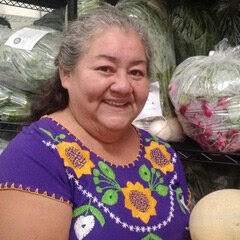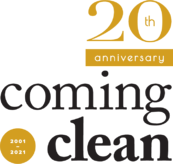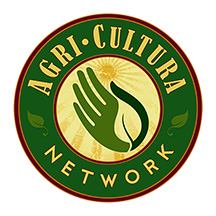April Spotlight: Agricultura Cooperative Network
|
|
Agricultura Cooperative NetworkMembers: Helga Garza
|
|
|
About ACNThe Agricultura Cooperative Network (ACN), doing business as Agri‑Cultura Network, provides access to local produce to promote nutrition and economic development through traditional and innovative agricultural practices, therefore furthering environmental and community stewardship to strengthen the agrarian and cultural heritage of our land and its residents. As a cooperative with seven member farms, our wholesale business program aggregates, processes, delivers, collects customer payment, and distributes farm payment. In addition, we support development of farm capacity while providing nutrition education and food access through a CSA and community events. |
Our work with the Coming Clean NetworkAgricultura Cooperative Network has been a grassroots anchor group, both for the Campaign for Healthier Solutions and the Local Food Solutions project. As a cooperative of small farmers on the ground in New Mexico, ACN has provided crucial vision, strategy, and infrastructure to make possible the Local Food Solution project’s mission of providing healthy, sustainable food, to be sold in Albuquerque’s dollar stores. |

|
"The goal is to keep all of this production local and regional, so that it stays within our state and keeps building the capacity of sustainable and regenerative, small farms. We want to build this on a generational capacity to make sure that the next generation has a viable market -- a viable livelihood -- to continue to want to preserve the traditional forms of growing here in New Mexico."— Helga Garza |
Tell us about your organization and what kind of vision you’re working for in the world?
Agricultura Network formed through a cooperative model, and we have seven farms in the South Valley of Albuquerque. We work with another 36 allied farms throughout the state of New Mexico. We are all small farmers: “Small” meaning a quarter of an acre or hoop house up, to 14 acres. All of our farmers use organic methods for growing food.
The purpose of ACN is to bring together all of these farming entities that are using sustainable and regenerative methods of growing food and that all have the common goals of keeping their produce local, building capacity of the farmers collectively, and keeping it non-competitive. All of our prices are set by our farmer board, so they receive some of the top-quality payment that is provided to the farmers here in the state of New Mexico.
Our markets are the Public Education Department on a statewide level, New Mexico hospital, and many state agencies, including the Aging and Long-Term Services through their nutrition sites, and early childhood centers. We also have a 320-member community supported agriculture (CSA) program that is focused on communities in need. We support partner organizations, neighborhood associations, and community-driven groups that have a focus on helping the populations that otherwise would not be able to afford or have access to organic produce.
We work on many different levels to make it all happen. We have a farm training program where we partner with Bernalillo County Open Space. The outcomes of that partnership are building new farms – businesses -- here in New Mexico, and also it allows Bernalillo County to purchase agricultural land that otherwise would go to unhealthy economic development. We work on various water issues on policy level with the New Mexico Acequia Association, and we also do policy change work around procurement and streamlining state agencies like PED, senior nutrition programs and early childhood centers.
How has being a part of the Coming Clean network been a part of your work, and what are some of the things that you’ve worked on collaboratively?
When I was introduced to Coming Clean, I came from organizing through the Southwest Network for Environmental and Economic Justice (SNEEJ). We were a network of over 60 grassroot organizations in the Southwest and in Northern Mexico, and we were all people of color. So, we took the narrative that we spoke for ourselves, and we built our solidarity and our collective impact amongst organizations and communities of color.
Richard Moore, who is a part of Environmental Justice Health Alliance (EJHA) which is partnered with Coming Clean, introduced me to Coming Clean and said, “These are the folks that we're working with now.” At first, I was a little bit shocked, because we had worked for so many years on the collective impact of people of color organizations working on Environmental Justice (EJ) issues. So, it set me back a little bit, but I trusted him in the relationship he had built with Coming Clean and EJHA.
Then I started to take part in the Youth Organizing Initiative and then furthering our work with Coming Clean was the Dollar Store Campaign (also called the Campaign for Healthier Solutions), where we were organizing around chemical policy reform amongst the dollar stores. We put out the report A Day Late and a Dollar Short, and that is where I really saw the impact that Coming Clean was having leading some of those efforts. Having access to researchers and the ability to produce reports at that level put the environmental justice (EJ) work at another level for me personally. Many of the challenges that we had as frontline communities of color came from not having access to a lot of the pieces needed in order to produce reports at that level. That was the big stepping stone in really engaging with Coming Clean and what it represented, and how it could build on our skills as frontline communities, and what we were able to work with collectively in order to move the EJ movement from frontline communities even further.
The Dollar Store campaigns have taken us through many steps of learning to where we are now, specifically with the Local Food Solutions project coming out of the Campaign for Healthier Solutions. We are now in conversation with Dollar General executives. They have come to the South Valley of Albuquerque. They have come to where our farm-to-market system takes place at the South Valley Economic Development Center.
We had a national meeting before Dollar General executives came where we did a local, statewide, and then a national bringing together of groups to move this effort forward to get local produce into Dollar General. For us, it was very important to build those relationships, to have the maturity and the expertise to challenge their procurement practices, to challenge their lack of investment. The most impactful piece has been the educational process that not only we have had as frontline communities, but also to educate that corporate structure on how to be good investors, and the impact that they're having by not supporting local fronts.
In another 20 years if pieces of these visions are realized what will be different?
It’s going from the corporate structure of extraction to the corporate structure that a community is holding them accountable. And giving them the vision that if we work collectively together, what positive outcomes it can really have.
Again, if we didn't take on these campaigns, so many of the toxic chemicals used on a daily basis by our children, our families -- it would be business as usual. If we hadn't challenged corporate powers that be through the reports, they would still question our organizing strategies, saying that they were not effective or were not professional reports. But when we were able to say all of these testing was done through EPA-certified labs, that takes it into a whole other level of community organizing.
"It's important that the corporate world sees that the community is holding them accountable, and the community has the knowledge to keep them accountable. It was victorious when we would go into the Dollar General stores and the workers would say, “Corporate office called and said we needed to pull all these products out.” Another time we walked in and it said the baby products no longer had BPA. It was like, wow, we have made a difference in the world. We have made a difference for future generations. That is something that no one can ever take away from us."— Helga Garza |




